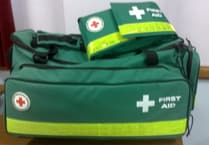As holidaymakers flock to beaches across the UK, a summer safety campaign from HM Coastguard urges visitors to stay safe by following simple safety advice at the coast.
Through posters, safety messaging and case studies, HM Coastguard’s Coast Clever summer safety campaign warns of coastal dangers and hazards, including cliff falls, tidal cutoffs, offshore winds and mud.
An innovative 360-degree video with a Coastguard Rescue Team gives viewers first-hand experience of what it’s like to be cut off by the tide. This interactive video provides a new perspective as part of the summer coastal safety campaign.
Coastal trip ‘must-do’s from Max Hawkins, Milford Haven Maritime Rescue Coordination Centre
- Check the tide times for the areas you visit before you embark on walks or activity at the coast.
- Always carry a fully charged mobile phone. If you’re going in the water, put it in a waterproof case.
- Look at the geography – could you be trapped or caught out by cliffs or inaccessible areas? Avoid mud and rocks. Keep clear of cliff bases.
- Consider geolocating apps, which can provide an accurate location and whereabouts for use by emergency services.
- If you’re in an unfamiliar area, tell a friend where you’re going and when you think you’ll be back. They could raise the alarm if you don’t return.
Case study
As term ended, Cardiff Metropolitan university students Alex and George were looking for an afternoon’s adventure. In less than 20 minutes, a short train trip had put the pair on Penarth’s picturesque pebble beach.
“It’s a simple trip out of town to get to Penarth. It was a sunny day, and our plan was to walk from one end down to the pier and back,” says George, a 19-year-old student from Telford in Shropshire.
Wearing waterproofs, hiking gear and boots, the two friends made their way along the beach at late afternoon while taking in the sunset. But three quarters down the coastline, they discovered that tide was moving faster than they could.
“It had started to come in completely and we knew we were getting cut off, but we thought we could make it to the other side. We ran back down the beach, but the high cliffs were trapping us from getting off.
“We were stressing as it was getting dark, and the tide just came in so quickly. At times, we were having to scale the cliff face, and it wasn’t stable. We didn’t have a chance. If we’d have entered the water to swim for safety, there’d be nowhere we could go. I just said ‘this is it’ and dialled 999."
Max Hawkins, Team Leader at Milford Haven Maritime Rescue Coordination Centre (MRCC), remembered George’s call. He said: “George did exactly the right thing by calling for emergency help as soon as he needed it.
“When people are stuck or in trouble at the coast or in the water, they need to dial 999 and ask for coastguard. Asking for the coastguard at the start of a 999 call ensures that the information provided goes straight to the right emergency service.”
In George’s case, the coastguard was able to identify his position via the 999 call. He said: “Obviously, the coastguard needed to know where we were but I had no idea – there were no immediate landmarks. We were in the middle of nowhere on a remote beach and it was dark."
Luckily, George had a smartphone app that he used to share his coordinates with Max’s team. The response was swift, and in a few moments coastguards reassured George that a rescue team was being assembled.
“It was really quick,” says George. “I think I had about three calls with the coastguard who kept updating me with a plan. They called back again to let me know that a lifeboat was coming too.”
Spotting the RNLI lifeboat in the distance, George and Alex put their smartphone lights on and started waving. The lifeboat saw the pair and quickly took them to safety.
Speaking about wisdoms learned, George said: "If you’re going to go out on the coast, make sure you check the tide times for the area too – it’s something I’m very much aware of now.”
Despite equal recognition of risk between genders, men are far more likely to have a fatal accident - in 2024 males accounted for 84% of all drownings in the UK. Stay Coast Clever this summer with these simple tips: • Check tide times before you go – an outgoing tide is best for a coastal walk as it will give you plenty of time to get back without getting cut off • Make sure your mobile is fully charged • Tell someone where you’re going and what time you’re likely to be back • In a coastal emergency, call 999 and ask for the Coastguard Comedian and musician Arthur Hill got involved in helping us to raise awareness. He commented: “I was surprised at how quickly I could see the tide coming in from the safety of the cliff top. The coastguard rescue teams did a brilliant job of demonstrating what a cliff rescue is like, but I certainly wouldn’t want to get caught out and will be checking tide times ahead of my future visits to the coast.” #CoastClever #SearchAndRescue
Keep safe this summer
This message comes as the UK enjoys a spell of extraordinary weather after the driest spring in a century, with the Met Office predicting the country is ‘twice as likely’ to have a hot summer, with an increased risk of heatwaves.
According to the Water Incident Database (WAID), over the last three years most drownings occurred in July, with a majority of casualties being males in the 20-29 age bracket. Last year, HM Coastguard responded to over 600 tidal cut off incidents.
Chief Coastguard Pat O’Callaghan said: “Each year, HM Coastguard responds to reports of people in danger at the coast, but many of these situations can be avoided. Through our Coast Clever campaign, we’re aiming to provide essential tips and guidance to help keep people safe this summer.
“We’d like the public to enjoy the warmer weather and our wonderful coastline, but they need to be aware of the risks. Mud, tides, cliffs and offshore winds can very quickly put lives in danger. If you need help during a coastal emergency, call 999 and ask for Coastguard.”
HM Coastguard recommends that those visiting the coast follow simple safety advice to avoid hazards. The guidance includes carrying a fully charged mobile phone and advising others of your whereabouts during your trip. Tide times and weather conditions should also be checked before arrival.
HM Coastguard’s top tips to stay safe and have an enjoyable day at the coast:
- Check the weather forecast and tide times before you set off.
- Cliffs can be unstable, so stay clear of cliff edges and bases.
- Watch out for mud and if you do get stuck, lean back to spread your weight.
- Avoid water sports in an offshore wind, when the wind blows from the land out to sea.
- Tell someone where you are going and when you’ll be back.
- Take a fully charged mobile phone and consider taking a PLB (personal locator beacon) which alerts the emergency services from the remotest of locations.
- In a coastal emergency, call 999 and ask for the Coastguard.





Comments
This article has no comments yet. Be the first to leave a comment.